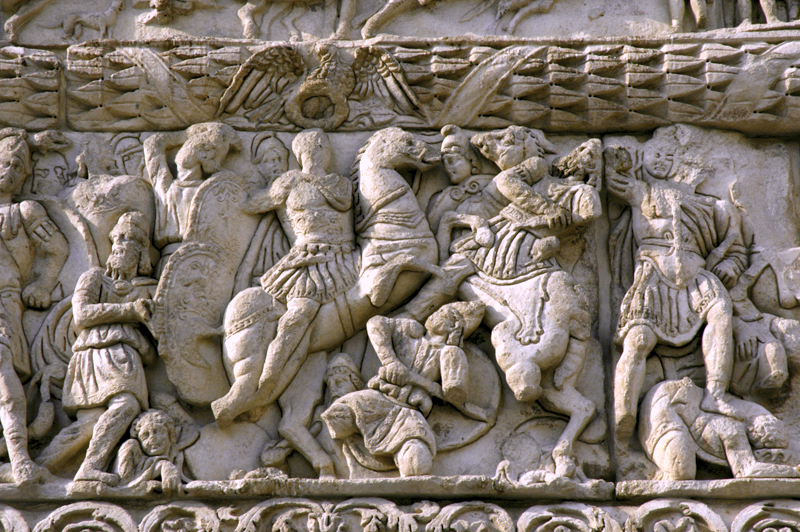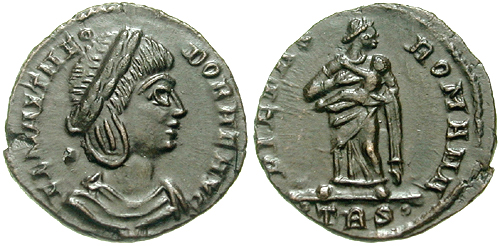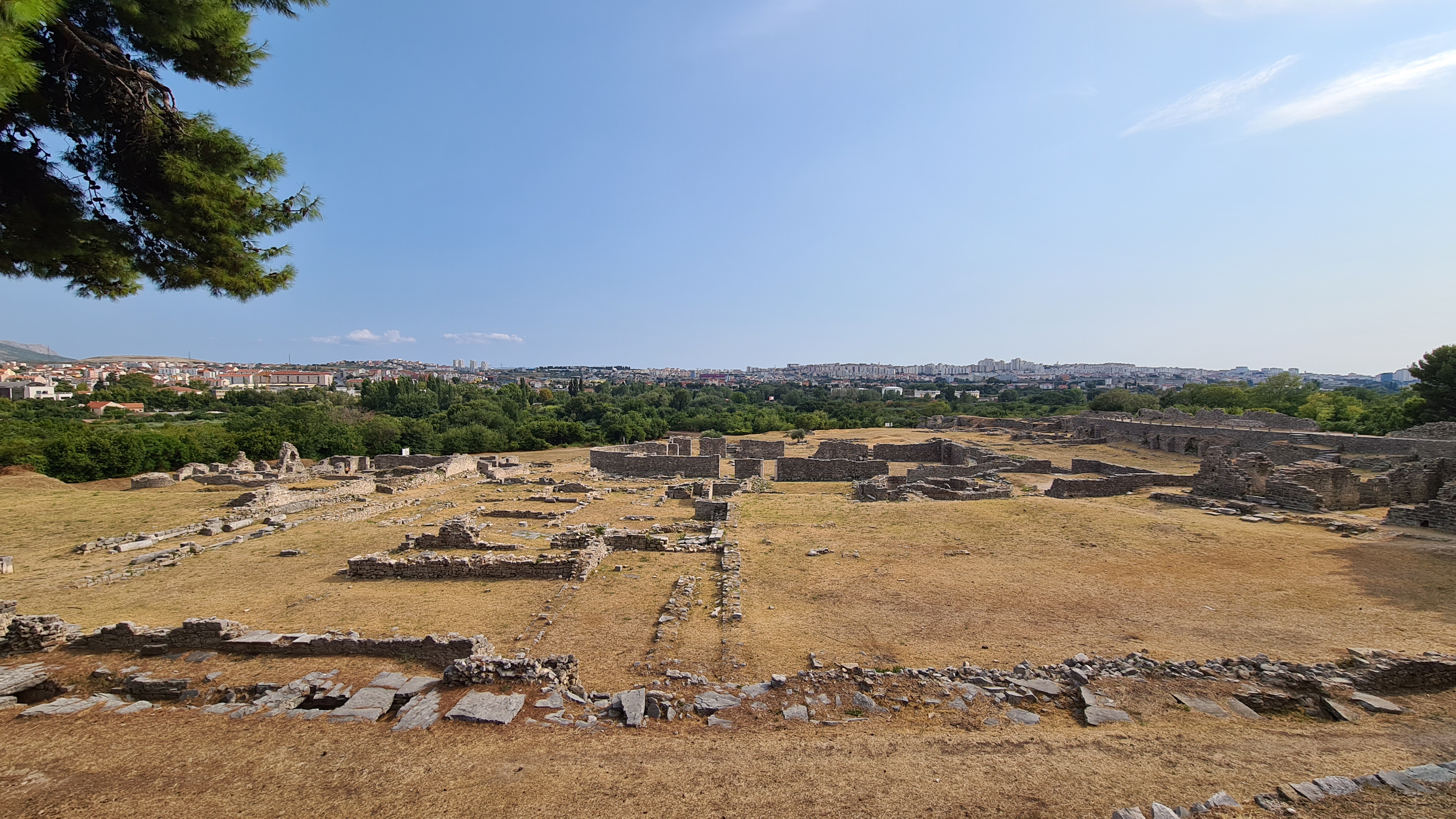|
Diocletian
Diocletian ( ; ; ; 242/245 – 311/312), nicknamed Jovius, was Roman emperor from 284 until his abdication in 305. He was born Diocles to a family of low status in the Roman province of Dalmatia (Roman province), Dalmatia. As with other Illyrian emperors, Illyrian soldiers of the period, Diocles rose through the ranks of the military early in his career, serving under Aurelian and Probus (emperor), Probus, and eventually becoming a Roman cavalry, cavalry commander for the army of Emperor Carus. After the deaths of Carus and his son Numerian on a campaign in Sasanian Empire, Persia, Diocles was proclaimed emperor by the troops, taking the name "Diocletianus". The title was also claimed by Carus's surviving son, Carinus, but he was defeated by Diocletian in the Battle of the Margus. Diocletian's reign stabilized the empire and ended the Crisis of the Third Century. He initiated the process of the Roman Empire split and appointed fellow officer Maximian as ''Augustus (title), Augu ... [...More Info...] [...Related Items...] OR: [Wikipedia] [Google] [Baidu] |
Diocletian's Palace
Diocletian's Palace (, ; ) is an ancient Roman palace and fortress complex built at the end of the third century AD by the Roman Emperor Diocletian as his retirement residence. About half of the complex was for Diocletian's personal use, with the rest housing the military garrison. The complex was built on a peninsula southwest from Salona, the former capital of Dalmatia, one of the largest cities of the late empire with 60,000 people and the birthplace of Diocletian. Today the palace forms about half of the old town of Split, Croatia, with 3,000 inhabitants and numerous shops, boutiques, cafes, bars, and restaurants. In 1979, it was listed by UNESCO as a World Heritage Site. History Diocletian had ordered the construction of the heavily fortified compound near his hometown of Spalatum in preparation for his retirement on 1 May 305 AD. The site chosen was near Salona, the provincial administrative centre of Dalmatia, on the southern side of a short peninsula. Based on Roman ... [...More Info...] [...Related Items...] OR: [Wikipedia] [Google] [Baidu] |
Maximian
Maximian (; ), nicknamed Herculius, was Roman emperor from 286 to 305. He was ''Caesar (title), Caesar'' from 285 to 286, then ''Augustus (title), Augustus'' from 286 to 305. He shared the latter title with his co-emperor and superior, Diocletian, whose political brain complemented Maximian's military brawn. Maximian established his residence at Trier but spent most of his time on campaign. In late 285, he suppressed rebels in Gaul known as the Bagaudae. From 285 to 288, he fought against Germanic tribes along the Rhine frontier. Together with Diocletian, he launched a scorched earth campaign deep into Alamannic territory in 288, refortifying the frontier. The man he appointed to police the English Channel, Channel shores, Carausius, rebelled in 286, causing the secession of Britain and northwestern Gaul. Maximian failed to oust Carausius, and his invasion fleet was destroyed by storms in 289 or 290. Maximian's subordinate Constantius Chlorus, Constantius campaigned against Cara ... [...More Info...] [...Related Items...] OR: [Wikipedia] [Google] [Baidu] |
Galerius
Galerius Valerius Maximianus (; Greek: Γαλέριος; 258 – May 311) was Roman emperor from 305 to 311. He participated in the system of government later known as the Tetrarchy, first acting as '' caesar'' under Emperor Diocletian. In this period Galerius obtained victory warring against the Persian Sassanian Empire, defeating Narseh at the battle of Satala in 298 and possibly sacking the Sassanian capital of Ctesiphon in 299. He also campaigned across the Danube against the Carpi, defeating them in 297 and 300. Galerius was promoted to ''augustus'' upon the abdication of Diocletian in 305, but had to contend with multiple usurpers as the Tetrarchic system broke down. Although he was a staunch opponent of Christianity, he ended the Diocletianic Persecution by issuing the Edict of Serdica in 311. Early life Galerius was born in the Danube provinces, either near Serdica or at the place where he later built his palace named after his mother – Felix Romuliana ( Gamzigr ... [...More Info...] [...Related Items...] OR: [Wikipedia] [Google] [Baidu] |
Tetrarchy
The Tetrarchy was the system instituted by Roman emperor Diocletian in 293 AD to govern the ancient Roman Empire by dividing it between two emperors, the ''augusti'', and their junior colleagues and designated successors, the ''caesares''. Initially Diocletian chose Maximian as his ''caesar'' in 285, raising him to co-''augustus'' the following year; Maximian was to govern the western provinces and Diocletian would administer the eastern ones. The role of the ''augustus'' was likened to Jupiter (mythology), Jupiter, while his ''caesar'' was akin to Jupiter's son Hercules. Galerius and Constantius Chlorus, Constantius were appointed ''caesares'' in March 293. Diocletian and Maximian retired on 1 May 305, raising Galerius and Constantius to the rank of ''augustus''. Their places as ''caesares'' were in turn taken by Valerius Severus and Maximinus Daza. The orderly system of two senior and two junior rulers endured until Constantius died in July 306, and his son Constantine the ... [...More Info...] [...Related Items...] OR: [Wikipedia] [Google] [Baidu] |
Constantius Chlorus
Flavius Valerius Constantius ( – 25 July 306), also called Constantius I, was a Roman emperor from 305 to 306. He was one of the four original members of the Tetrarchy established by Diocletian, first serving as Caesar (title), ''caesar'' from 293 to 305 and then ruling as Augustus (title), ''augustus'' until his death. Constantius was also father of Constantine the Great, the first Christian emperor of Rome. The nickname "Chlorus" () was first popularized by Byzantine Empire, Byzantine-era historians and not used during the emperor's lifetime. As an Illyrian emperors, Illyrian soldier of humble origin, Constantius had a distinguished military career and rose to the top ranks of the army. Around 289, he set aside Helena (mother of Constantine), Helena, Constantine's mother, to marry a daughter of Emperor Maximian, and in 293 was added to the imperial college by Maximian's colleague Diocletian. Assigned to rule Roman Gaul, Gaul, Constantius defeated the usurper Carausius th ... [...More Info...] [...Related Items...] OR: [Wikipedia] [Google] [Baidu] |
Split, Croatia
Split (, ), historically known as Spalato (; ; see #Name, other names), is the List of cities and towns in Croatia, second-largest city of Croatia after the capital Zagreb, the largest city in Dalmatia and the largest city on the Croatian coast. The Split metropolitan area is home to about 330,000 people. It lies on the eastern shore of the Adriatic Sea and is spread over a central peninsula and its surroundings. An intraregional transport hub and popular tourist destination, the city is linked to the List of islands in the Adriatic, Adriatic islands and the Apennine Peninsula. More than 1 million tourists visit it each year. The city was founded as the Greek colonisation, Greek colony of Aspálathos () in the 3rd or 2nd century BCE on the coast of the Illyrians, Illyrian Dalmatae, and in 305 CE, it became the site of Diocletian's Palace, the Palace of the Roman emperor Diocletian. It became a prominent settlement around 650 when it succeeded the ancient capital of the Roman Emp ... [...More Info...] [...Related Items...] OR: [Wikipedia] [Google] [Baidu] |
Numerian
Numerian (; died November 284) was Roman emperor from 283 to 284 with his older brother Carinus. They were sons of Carus, a general raised to the office of praetorian prefect under Emperor Probus in 282.Leadbetter, "Carus." Early life and Carus' reign Numerian was the younger son of Carus.Leadbetter, "Carus." In 282, the legions of the upper Danube in Raetia and Noricum proclaimed as emperor Numerian's father, the praetorian prefect Marcus Aurelius Carus, after a mutiny against the emperor Probus, in which the latter was killed. By one account, Carus had ''himself'' rebelled against the emperor, and Probus' army, stationed in Sirmium (Sremska Mitrovica, Serbia), decided they did not wish to fight Carus and assassinated their emperor instead. According to the ''Historia Augusta'', Carus was not responsible for Probus's death, and inflicted severe punishment upon the murderers. Carus, already sixty, wished to establish a dynasty and immediately elevated Carinus and Numerian ... [...More Info...] [...Related Items...] OR: [Wikipedia] [Google] [Baidu] |
Nicomedia
Nicomedia (; , ''Nikomedeia''; modern İzmit) was an ancient Greece, ancient Greek city located in what is now Turkey. In 286, Nicomedia became the eastern and most senior capital city of the Roman Empire (chosen by the emperor Diocletian who ruled in the east), a status which the city maintained during the Tetrarchy system (293–324). The Tetrarchy ended with the Battle of Chrysopolis (Üsküdar#Chrysopolis, Üsküdar) in 324, when Constantine the Great, Constantine defeated Licinius and became the sole emperor. In 330 Constantine chose for himself the nearby Byzantium (which was renamed Constantinople, modern Istanbul) as the new capital of the Roman Empire. The city was incorporated into the Ottoman Empire with the victory of Sultan Orhan Gazi against the Byzantine Empire. The Byzantines managed to retake it in the aftermath of the Battle of Ankara, but it fell definitively to the Ottomans in 1419. History It was founded in 712–711 BC as a Megarian colony and was original ... [...More Info...] [...Related Items...] OR: [Wikipedia] [Google] [Baidu] |
Prisca (empress)
Aurelia Prisca (died 315) was a Roman empress as the wife of the emperor Diocletian. Biography Prisca was already married and had a daughter with Diocletian when he became emperor. She was not granted the title of ''Augusta'' or ''Caesarissa'' but instead ''Nobilissima Femina''. Lothar Wickert proposed in 1974 based on her daughter Galeria Valeria's name that Prisca's ''nomen gentilicium'' may have been Galeria gens, Galeria. He also theorized that her husband picked Galerius as a son-in-law and heir because he was related to Prisca. An inscription on a statue base at a temple to Jupiter in Salona gives her name as Aurelia Prisca. Byron Waldron has proposed that the name Aurelia might have been added to Prisca's name when Diocletian and his co-emperor Maximian exchanged their respective names "Valerius" and "Aurelius" with each other, to strengthen dynastic ties. When her husband retired to Split (city), Spalatum in 305, Prisca stayed with her daughter and son-in-law in Thessal ... [...More Info...] [...Related Items...] OR: [Wikipedia] [Google] [Baidu] |
Carinus
Marcus Aurelius Carinus (died 285) was Roman Emperor from 283 to 285. The eldest son of the Emperor Carus, he was first appointed '' Caesar'' in late 282, then given the title of ''Augustus'' in early 283, and made co-emperor of the western part of the Empire by his father. Official accounts of his character and career, which portray him as dissolute and incompetent, have been filtered through the propaganda of his successful opponent Diocletian. Reign After the death of Emperor Probus in a spontaneous mutiny by the army in 282, his praetorian prefect, Carus, ascended to the throne. When he left for the Persian war, he elevated his two sons to the title of Caesar. The elder, Carinus, was left to manage the affairs of the West in his absence, and was later elevated to the rank of Augustus, while the younger, Numerian, accompanied his father to the East. Carinus acquitted himself well, at least at first, showing some merit in suppressing unrest in Gaul and against the Quadi, ... [...More Info...] [...Related Items...] OR: [Wikipedia] [Google] [Baidu] |
Western Roman Empire
In modern historiography, the Western Roman Empire was the western provinces of the Roman Empire, collectively, during any period in which they were administered separately from the eastern provinces by a separate, independent imperial court. Particularly during the period from AD 395 to 476, there were separate, coequal courts dividing the governance of the empire into the Western provinces and the Eastern provinces with a distinct Line of hereditary succession, imperial succession in the separate courts. The terms Western Roman Empire and Byzantine Empire, Eastern Roman Empire were coined in modern times to describe political entities that were ''de facto'' independent; contemporary Ancient Rome, Romans did not consider the Empire to have been split into two empires but viewed it as a single polity governed by two imperial courts for administrative expediency. The Western Empire collapsed in 476, and the Western imperial court in Ravenna disappeared by AD 554, at the end of Ju ... [...More Info...] [...Related Items...] OR: [Wikipedia] [Google] [Baidu] |
Salona
Salona (, ) was an ancient city and the capital of the Roman province of Dalmatia and near to Split, in Croatia. It was one of the largest cities of the late Roman empire with 60,000 inhabitants. It was the last residence of the final western Roman Emperor Julius Nepos and acted as the ''de facto'' capital of the Western Roman Empire during the years 476-480. Salona was founded in the 3rd century BC and was mostly destroyed in the invasions of the Avars and Slavs in the seventh century AD. Many Roman characteristics can be seen such as walls, a forum, a theatre, an amphitheatre, public baths and an aqueduct. Location Salona was founded on a sheltered inlet on the coast. Salona is located in the modern town of Solin, next to Split, in Croatia. The terrain around Salona slopes gently seaward and is typical karst, consisting of low limestone ridges running east to west with marl in the clefts between them. History Salona grew in the area of the Greek cities of Traguri ... [...More Info...] [...Related Items...] OR: [Wikipedia] [Google] [Baidu] |







